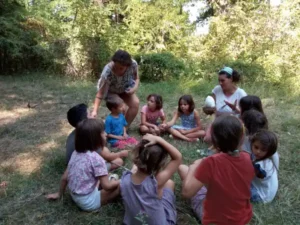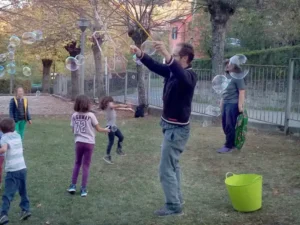Campo estivo | ||
Here you can find a thorough description about Semidiarcobaleno’s summer camps.
The proposals include both the “classic” children’s camp as well as an offer for the whole family. | ||
Educational model1) CreativityCreativity is not taught but encouraged by creating the conditions for its development. In this regard, the expressive and manual workshops stimulate the natural curiosity and autonomy of children by offering a fertile humus for their personal growth. These workshops suggest a valid pedagogical alternative to an approach based solely on performance and results: learning to listen in a intimate space and without judgment is a powerful antidote to the competitive frenzy in which the educational system often stumbles and it is in this condition that we find the tools to express and evolve. To this scope, creativity has not only to do with artistic skills, but also and above all, with the ability to devise and pursue solutions that are innovative and useful at the same time to the most diverse problems. 2) Nature connectednessThe relationship that children establish with Nature is primordial and direct. Through the daily observation of plants, animals and every other living form many questions arise spontaneously that channel their innate and inexhaustible curiosity and it is Nature, our first great teacher, to provide the answers. It is in this deep and immediate contact that children, privileged observers, recognize with simplicity that we are part of a greater whole. 3) Autonomy of the childThe child must be educated to solve everyday problems and to face difficulties by himself.
As Maria Montessori said:
4) Self-knowledgeAnother of the benefits of a creative, curious and autonomous education is that these are the tools to build a healthy and solid contact with your inner self. These are also the foundations for using theemotional intelligence in a free and easy way by persevering in the face of difficulties, with self-confidence and the possibility of achieving goals. It is always on these premises that the children find the courage to show their true self, defusing the fear of making mistakes and thus accepting constructively the criticisms of others. 5) SocializationThe summer camp is the ideal opportunity to promote relational skills, empathy and to learn to work in a group. This is the most appropriate educational context to stimulate in a harmonious way the emotional intelligence and the ability to problem solving through games of socialization, cooperation and facing new situations. In the Semidiarcobaleno’s summer camps, a special attention is paid to the educational supervision of interpersonal dynamics, both individual and in group. 6) The educatorsTo understand the child, the adult must learn to understand his inner world, his rules, his language. He must not look down on him, but at his own height (straight in the eyes), he must be child-friendly. And most importantly, the educator has to make him feel accepted. In an environment in which he fears that he is not appreciated enough, no child will be able to freely express his creativity. |

